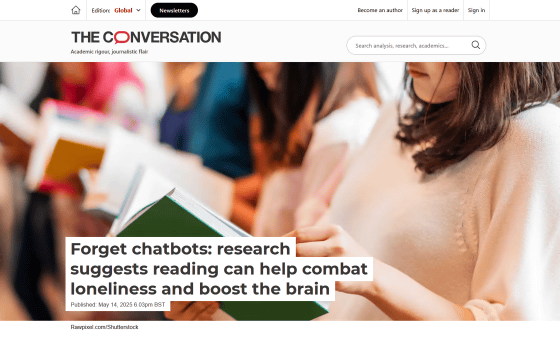Research shows that reading reduces loneliness and boosts the brain

Many people in modern society are lonely, and some are addicted to interacting with AI chatbots to heal their loneliness. As loneliness becomes a social problem,
Forget chatbots: research suggests reading can help combat loneliness and boost the brain
https://theconversation.com/forget-chatbots-research-suggests-reading-can-help-combat-loneliness-and-boost-the-brain-256613

Loneliness is a problem for a wide range of generations, and according to a report by the World Health Organization (WHO), about 25% of seniors and 5-15% of teenagers feel lonely. In this situation, AI development companies are promoting 'conversations with AI chatbots' that can help alleviate loneliness.
In fact, Mark Zuckerberg, CEO of Meta, a company focused on developing AI, said in a 2025 interview, 'The average American has fewer than three friends. The average person wants more friends,' arguing that AI chatbots could help make up for modern people's lack of friends.
In response, Sahakian and others argue that human interaction is more important than AI chatbots. A 2023 study concluded that having about five close friends is enough for children and adolescents to develop healthily and maintain good brain structure, cognitive ability, academic performance, and mental health. If you have few close friends, you may not be able to have enough social interaction, and even if you have a large number of connections on social media, you may not be able to get social support.
While interacting with AI chatbots may indeed help alleviate loneliness, they don't provide the face-to-face social interaction people need to thrive. Research conducted during the COVID-19 pandemic has shown that face-to-face interaction is important for mental health, and some studies have found that lonely people feel even lonelier when they use AI chatbots.
Research shows that using AI chatbots makes lonely people feel even lonelier - GIGAZINE

'Various studies, including our own, suggest that reading may be a much better solution than chatbots,' Sahakian et al. say, arguing that reading, rather than AI chatbots, is an effective way to deal with loneliness.
For example, a study by the charity and book club The Queen's Reading Room showed that even a short amount of time spent reading can reduce stress by around 20% and improve focus and attention by up to 11%. They also found that reading early in the day can make people feel more connected to others and motivated to take on challenges, and that reading fiction can significantly reduce feelings of loneliness.
Another charity, The Reader, conducted a survey of nearly 2,000 participants and found that 74% of participants said that reading had a positive effect on their mental health and well-being. The benefits of reading are particularly strong among younger people, with around 59% of 18-34 year olds feeling that reading has made them more connected to others, and 56% reporting that reading has reduced their feelings of loneliness during the pandemic.
A 2024 study also showed that students' participation in book clubs had significant emotional and social benefits: For example, 42.9% of students felt more connected to others as a result of reading, 61.2% believed they had a greater understanding of others' experiences and beliefs, and 14.3% reported feeling less lonely.

Furthermore, a study of 469 subjects aged 75 years or older who were dementia-free at the start of the study, followed for 5.1 years, showed that reading reduced the risk of dementia by 35%. Similarly, many studies have shown that reading slows cognitive decline and reduces the risk of dementia.
In a study of more than 10,000 children, Sahakian and his colleagues found that children who read for recreational purposes in their early years had better brain structure, cognitive function, and academic performance in adolescence, as well as longer sleep, better mental health, and less inattention, stress, and depression. Even more important, Sahakian and his colleagues point out, 'They had less screen time and better social interactions.'
'AI chatbots can enrich our lives in many ways, but they are not a silver bullet,' Sahakian et al. said. 'We know that while technology has many benefits, it also creates many unforeseen problems. Solve problems like loneliness and social isolation through reading and book clubs. Reading is also a great way to improve brain structure, cognitive function, and health.'

Related Posts:
in Science, Posted by log1h_ik







